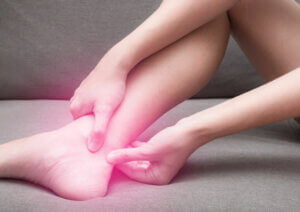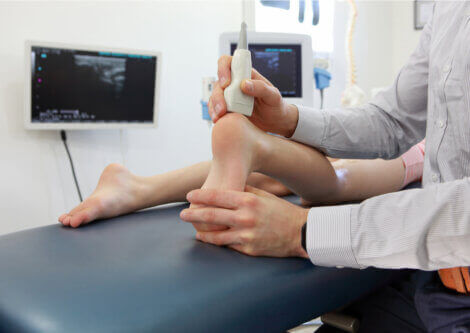What are the Causes of Achilles Tendonitis?

In this article, we’re going to go over the causes of Achilles tendonitis, which can be a very painful injury. This problem can make each step that you take difficult. As with most cases of tendonitis, getting better can take quite a while.
When you understand this kind of injury better and know why it can happen, it’s easier to understand how to treat it. Firstly, let’s take a look at exactly what this injury is.
What is Achilles tendonitis?
Achilles tendonitis is when the Achilles tendon suffers from tendonitis. The Achilles tendon is the thick fibrous cord at the back of your leg that connects your calf muscles to your heel bone, and it can become sore and inflamed.
This tendon’s job is to allow you to flex your foot, making your toes point downwards. This means that every single step you take throughout your life requires your Achilles tendon to be working.
If your Achilles tendon is inflamed or injured, you won’t be able to walk normally, and it’ll be painful when you try to. What can cause this inflammation?
Causes of Achilles tendonitis
This injury happens when the tendon is overused. In other words, you can injure the tendon if you demand more of it than what it’s able to bear. You can also injure it if you put it under stress over a prolonged time period. Generally, the main causes of Achilles tendonitis are the following:
- Training sessions that are too intense. If you train for a sport that requires you to jump or sprint, for instance, those movements put a big strain on the Achilles tendon. If your training sessions are also very intense, it’s more likely you’ll provoke tendonitis.
- Exercising when you’re not in shape. That is; if you have a sedentary lifestyle and then suddenly one day you decide to go for a long run or play soccer for a couple of hours… it’s likely your Achilles tendon will suffer.
- Not warming up before exercising. If you haven’t got your circulation pumping and your muscles and tendons aren’t prepared for exercise, the probability of injuring yourself increases dramatically.
- Having rigid or tense muscles. If your muscles aren’t flexible and healthy, it’s also more likely you’ll suffer from tendonitis. When a muscle is tense, it’ll pull on the tendon. If you add playing a sport into the mix, the stress your tendon is under will be even greater.

As we’ve seen, the causes of Achilles tendonitis are directly related to whether or not you’re in good physical shape when you want to play sports, for instance. Keeping your muscles healthy, relaxed, and flexible is essential in preventing tendonitis.
It’s also an excellent idea to vary your training methods or change up the sports you play. That way, you can avoid putting too much stress on any one group of muscles or tendons.
Risk factors
In addition to the above causes, the probabilities of injury are increased again by the following risk factors:
- Age. The greater your age, the weaker your tendons become. As you get older, you should take greater care when playing sports.
- Being overweight. The more weight your Achilles tendon has to bear, the greater your chances of injury.
- Physical problems. Problems such as flat feet or a misaligned knee can cause tendonitis. Your weight must be distributed correctly to avoid injury. However, these physical problems can affect your weight distribution.
- Faulty equipment. If you use worn-out shoes or always run on hard surfaces such as asphalt, you can also increase your chances of tendonitis. This is what a study shows that was published in The Journal of the American Board of Family Practice.
- Underlying medical conditions. Lastly, certain medical conditions such as high blood pressure or circulation problems can also increase a person’s risk of tendonitis. Also, some medications such as certain antibiotics can affect them. It’s a common situation with older adults, according to a study published in the journal Jama Internal Medicine.
Treatment
Now to add a brief note about treatment. Recovering from Achilles tendonitis is similar to recovering from other kinds of tendonitis. In the first place, it’s necessary to temporarily stop playing the sport that’s causing the problem. Other important measures include:
- Apply cold packs to the injury if it’s just recently become painful, or hot packs if you’ve had it for a few days.
- A visit to a physiotherapist is a good idea to learn how to stretch the area correctly. They’ll also help you to do gentle exercises to improve your balance.
- Buy good shoes or inner soles with good arch support to help you reduce the tension in your Achilles heel.

Achilles tendonitis: recovery and prevention
It’s important to know the steps you need to recover from tendonitis, but it’s even better to prevent it in the first place. Although you may recover, don’t forget that if you keep doing the same things that caused the injury, it’ll return.
With that in mind, if you want to keep playing the same sport, you’ll need to make some changes. It may be necessary to adapt your training sessions and alternate training with other activities. You may also benefit from a visit to a podiatrist to analyze potential physical problems with your gait.
In this article, we’re going to go over the causes of Achilles tendonitis, which can be a very painful injury. This problem can make each step that you take difficult. As with most cases of tendonitis, getting better can take quite a while.
When you understand this kind of injury better and know why it can happen, it’s easier to understand how to treat it. Firstly, let’s take a look at exactly what this injury is.
What is Achilles tendonitis?
Achilles tendonitis is when the Achilles tendon suffers from tendonitis. The Achilles tendon is the thick fibrous cord at the back of your leg that connects your calf muscles to your heel bone, and it can become sore and inflamed.
This tendon’s job is to allow you to flex your foot, making your toes point downwards. This means that every single step you take throughout your life requires your Achilles tendon to be working.
If your Achilles tendon is inflamed or injured, you won’t be able to walk normally, and it’ll be painful when you try to. What can cause this inflammation?
Causes of Achilles tendonitis
This injury happens when the tendon is overused. In other words, you can injure the tendon if you demand more of it than what it’s able to bear. You can also injure it if you put it under stress over a prolonged time period. Generally, the main causes of Achilles tendonitis are the following:
- Training sessions that are too intense. If you train for a sport that requires you to jump or sprint, for instance, those movements put a big strain on the Achilles tendon. If your training sessions are also very intense, it’s more likely you’ll provoke tendonitis.
- Exercising when you’re not in shape. That is; if you have a sedentary lifestyle and then suddenly one day you decide to go for a long run or play soccer for a couple of hours… it’s likely your Achilles tendon will suffer.
- Not warming up before exercising. If you haven’t got your circulation pumping and your muscles and tendons aren’t prepared for exercise, the probability of injuring yourself increases dramatically.
- Having rigid or tense muscles. If your muscles aren’t flexible and healthy, it’s also more likely you’ll suffer from tendonitis. When a muscle is tense, it’ll pull on the tendon. If you add playing a sport into the mix, the stress your tendon is under will be even greater.

As we’ve seen, the causes of Achilles tendonitis are directly related to whether or not you’re in good physical shape when you want to play sports, for instance. Keeping your muscles healthy, relaxed, and flexible is essential in preventing tendonitis.
It’s also an excellent idea to vary your training methods or change up the sports you play. That way, you can avoid putting too much stress on any one group of muscles or tendons.
Risk factors
In addition to the above causes, the probabilities of injury are increased again by the following risk factors:
- Age. The greater your age, the weaker your tendons become. As you get older, you should take greater care when playing sports.
- Being overweight. The more weight your Achilles tendon has to bear, the greater your chances of injury.
- Physical problems. Problems such as flat feet or a misaligned knee can cause tendonitis. Your weight must be distributed correctly to avoid injury. However, these physical problems can affect your weight distribution.
- Faulty equipment. If you use worn-out shoes or always run on hard surfaces such as asphalt, you can also increase your chances of tendonitis. This is what a study shows that was published in The Journal of the American Board of Family Practice.
- Underlying medical conditions. Lastly, certain medical conditions such as high blood pressure or circulation problems can also increase a person’s risk of tendonitis. Also, some medications such as certain antibiotics can affect them. It’s a common situation with older adults, according to a study published in the journal Jama Internal Medicine.
Treatment
Now to add a brief note about treatment. Recovering from Achilles tendonitis is similar to recovering from other kinds of tendonitis. In the first place, it’s necessary to temporarily stop playing the sport that’s causing the problem. Other important measures include:
- Apply cold packs to the injury if it’s just recently become painful, or hot packs if you’ve had it for a few days.
- A visit to a physiotherapist is a good idea to learn how to stretch the area correctly. They’ll also help you to do gentle exercises to improve your balance.
- Buy good shoes or inner soles with good arch support to help you reduce the tension in your Achilles heel.

Achilles tendonitis: recovery and prevention
It’s important to know the steps you need to recover from tendonitis, but it’s even better to prevent it in the first place. Although you may recover, don’t forget that if you keep doing the same things that caused the injury, it’ll return.
With that in mind, if you want to keep playing the same sport, you’ll need to make some changes. It may be necessary to adapt your training sessions and alternate training with other activities. You may also benefit from a visit to a podiatrist to analyze potential physical problems with your gait.
All cited sources were thoroughly reviewed by our team to ensure their quality, reliability, currency, and validity. The bibliography of this article was considered reliable and of academic or scientific accuracy.
- T. Sotelo. Tendinitis Aquilea en el corredor: Eficacia de los tratamientos ortopodológicos. Trabajo fin de grado para la Universidad de La Coruña. 2013
- R. Cortés, P. Cossío, E. Miñambres et al. Tendinitis aquílea en el anciano. Atención primaria. Volume 31, Issue 1, Page 51. 2005
- E. Naba. Tendinitis de Aquiles en corredores. Trabajo fin de grado para la Universidad FASTA. 2012
This text is provided for informational purposes only and does not replace consultation with a professional. If in doubt, consult your specialist.








